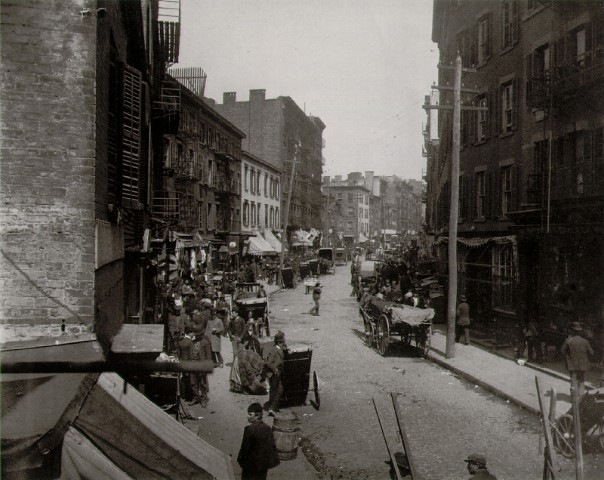
Monday 28 February 2011
palazzo trousers asda 16 pounds
 palazzo trousers 16 pounds
palazzo trousers 16 pounds
Sunday 27 February 2011
FASCISTS LOSE .THE GUARDIAN REPORT ON ENGLAND V ITALY 1934
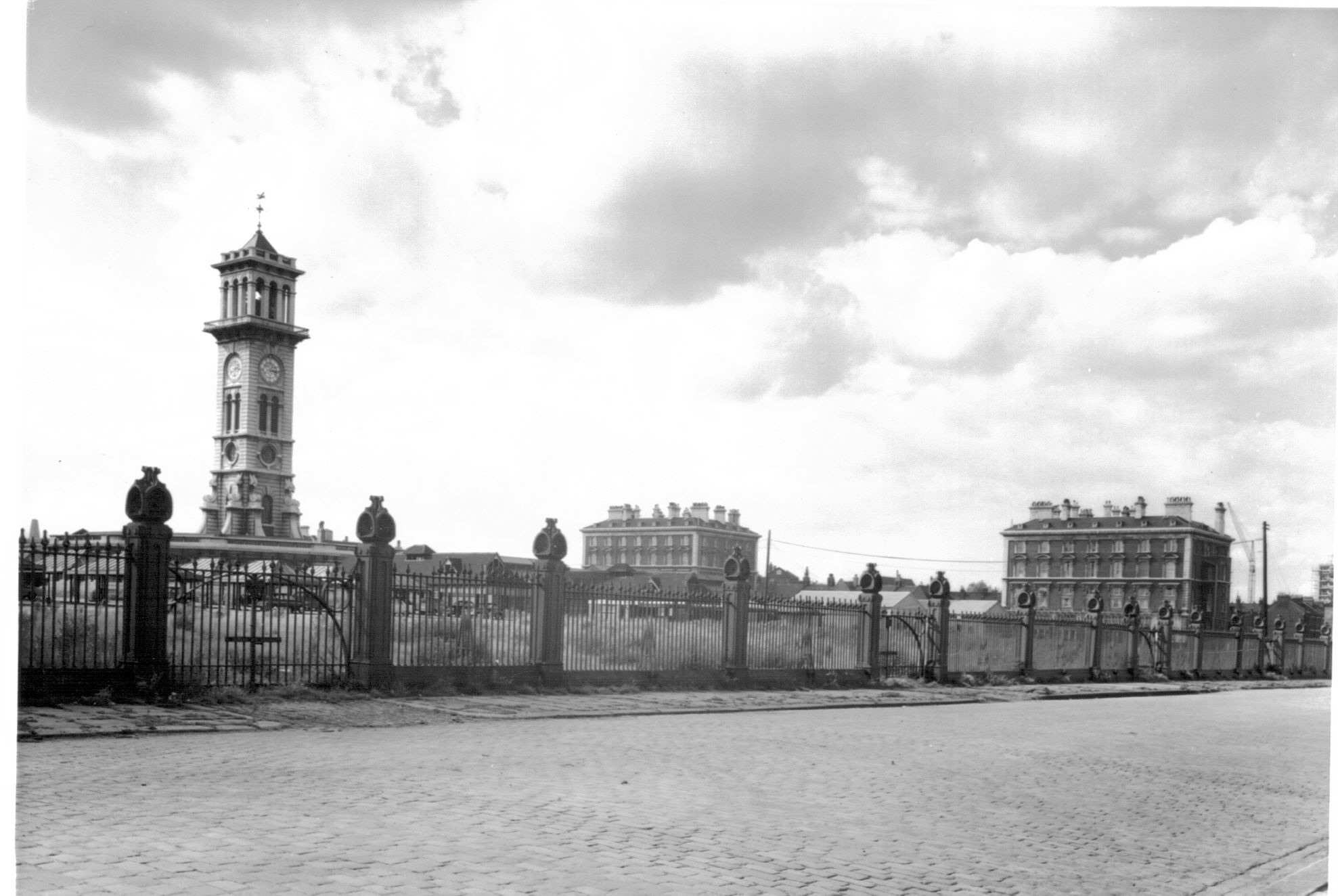 for the title of world's best. The game was brutal and full of incident; having missed a penalty, England went three up in 15 minutes, before the Azzurri's comeback.
for the title of world's best. The game was brutal and full of incident; having missed a penalty, England went three up in 15 minutes, before the Azzurri's comeback. 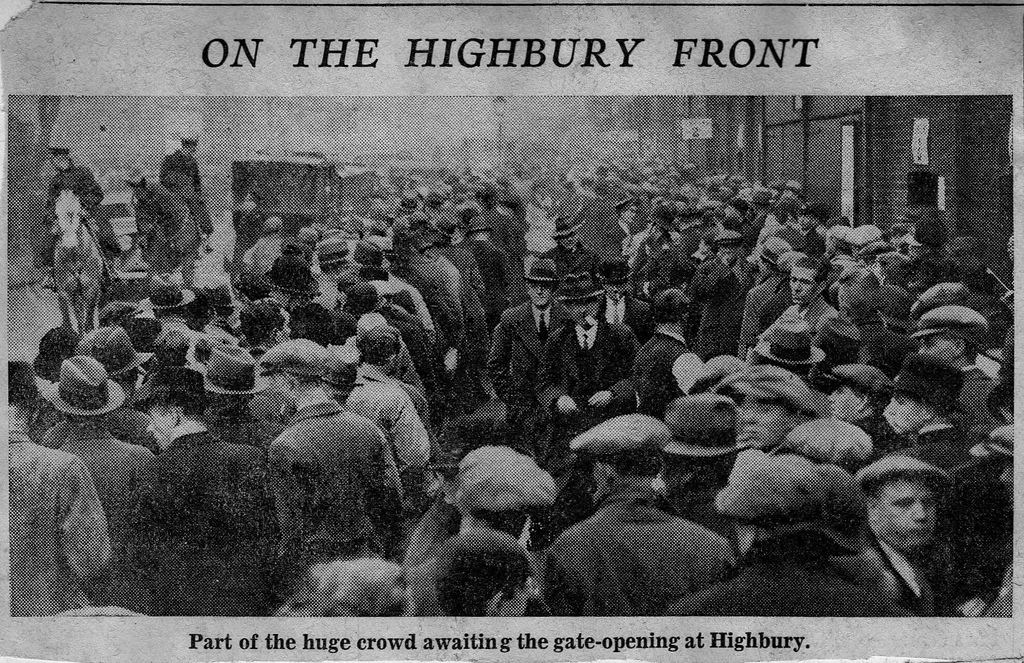
 Despite England's 3-2 victory, an outraged home press demanded they withdraw from internationals.
Despite England's 3-2 victory, an outraged home press demanded they withdraw from internationals.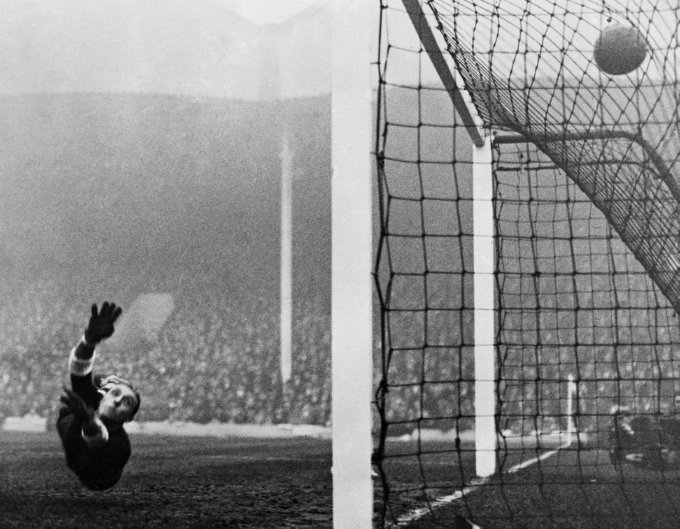 In Italy the game was heralded as a moral triumph, the team immortalised as the "Lions of Highbury".
In Italy the game was heralded as a moral triumph, the team immortalised as the "Lions of Highbury".
 but the English, rightly or wrongly, still considered themselves to be the strongest team in Europe.
but the English, rightly or wrongly, still considered themselves to be the strongest team in Europe. 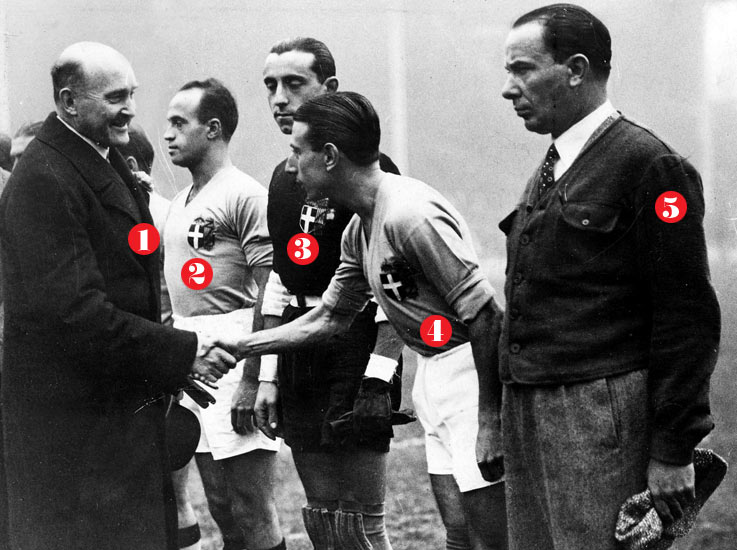
1 Prince of Connaught
The game was loaded with political undertones, in fact it was proclaimed by Benito Mussolini's regime to be a showdown between two ideologies, on and off the pitch. Il Duce was intensely keen that the fixture should take place, sending the English-speaking Azzurri coach Vittorio Pozzo to London to suggest the idea to the FA. Arthur, Prince of Connaught, a grandson of Queen Victoria, was joined at the ground by the Italian ambassador, while a sizable number of expats turned up to cheer on the visitors. Prince Arthur died in 1938, aged 55, from stomach cancer.

2 Giovanni Ferrari
Ferrari was the perfect foil for star player Giuseppe Meazza – who scored both Italy's goals – forming a creative inside-forward partnership. Part of the Juventus side that won five titles in a row (from 1930-35), Ferrari joined Meazza at Ambrosiana (as Inter were renamed under Mussolini's regime), then won a record eighth scudetto with Bologna. After coaching at Juventus and Inter, he took charge of the national team in 1960, overseeing (with Paolo Mazza) the 1962 World Cup campaign in Chile, which included the notorious "Battle of Santiago". He died in 1982, aged 74.
Ferrari joined Meazza at Ambrosiana (as Inter were renamed under Mussolini's regime), then won a record eighth scudetto with Bologna. After coaching at Juventus and Inter, he took charge of the national team in 1960, overseeing (with Paolo Mazza) the 1962 World Cup campaign in Chile, which included the notorious "Battle of Santiago". He died in 1982, aged 74.
 Ferrari joined Meazza at Ambrosiana (as Inter were renamed under Mussolini's regime), then won a record eighth scudetto with Bologna. After coaching at Juventus and Inter, he took charge of the national team in 1960, overseeing (with Paolo Mazza) the 1962 World Cup campaign in Chile, which included the notorious "Battle of Santiago". He died in 1982, aged 74.
Ferrari joined Meazza at Ambrosiana (as Inter were renamed under Mussolini's regime), then won a record eighth scudetto with Bologna. After coaching at Juventus and Inter, he took charge of the national team in 1960, overseeing (with Paolo Mazza) the 1962 World Cup campaign in Chile, which included the notorious "Battle of Santiago". He died in 1982, aged 74.
3 Carlo Ceresoli
Ceresoli played just eight times for Italy, despite impressing the Highbury crowd with his acrobatic style and first-minute penalty save ("a Spring-heel Jack with a splendid sense of anticipation", according to the Guardiancorrect).
 A distinguished domestic career saw him keeping goal for a number of Serie A bigwigs, including Atalanta, Ambrosiana, Bologna (where he won two scudetti) and Genoa, ending at Juventus for the 1941-42 season. He went into coaching after the war, taking charge of hometown club Atalanta on three separate occasions. He died in 1995, aged 84.
A distinguished domestic career saw him keeping goal for a number of Serie A bigwigs, including Atalanta, Ambrosiana, Bologna (where he won two scudetti) and Genoa, ending at Juventus for the 1941-42 season. He went into coaching after the war, taking charge of hometown club Atalanta on three separate occasions. He died in 1995, aged 84.
4 Raimundo Orsi
A zippy winger, "Mumo" Orsi was one of three oriundi (a South American of Italian descent who qualified to play for the Azzurri) in the visitors' line-up and played 13 times for Argentina before making his Italy debut in 1929. He had the chance to earn a draw at Highbury late on, only to mishit his shot after running through the English defence. A teammate of Ferrari's in that all-conquering Juve side, Orsi returned to South America in 1935, playing for Independiente, Boca Juniors and Peñarol. He died in 1986, aged 84.

5 Unknown coach
The game was loaded with political undertones, in fact it was proclaimed by Benito Mussolini's regime to be a showdown between two ideologies, on and off the pitch. Il Duce was intensely keen that the fixture should take place,
This friendly match was billed as the real World Cup final in the English press.Which we won, but it was the perceived dirty play of the Italians that made the headlines, as is clear from the report from the front of the Guardian's news section that day.

The match was a brutally intense encounter, so violent that it prompted widespread debate about whether England should withdraw from international football altogether. England
ITALY'S NARROW DEFEAT


Battle, Not Football
England beat Italy 3-2 in the Association international match at Highbury, London, yesterday. England's three goals were scored in the first 15 minutes, two of them by Brook, of Manchester City, but, although losing their centre half-back, Monti, a few minutes after the start, the Italians made a surprising recovery and came near to saving the game.
The football was of an unusually robust character, and many of the English players bore evidence of their hard ordeal. Hapgood, the captain, had a bone in his nose broken;
 Brook had to have his left arm X-rayed last night; Bowden had a damaged ankle, and Drake, the centre forward, had one leg severely hurt. One of the English players, unable to emulate the diplomacy of his
Brook had to have his left arm X-rayed last night; Bowden had a damaged ankle, and Drake, the centre forward, had one leg severely hurt. One of the English players, unable to emulate the diplomacy of his  captain, said: "It was not a game of football, it was a battle."
captain, said: "It was not a game of football, it was a battle."There were 51,000 spectators at the Highbury ground, among them Prince Arthur of Connaught, to whom both the teams were presented; Signor Grandi, the Italian ambassador and the marchese Marconi. The Italians had an enthusiastic following. In Berne constant reports on the progress of play were taken to signor Mussolini.
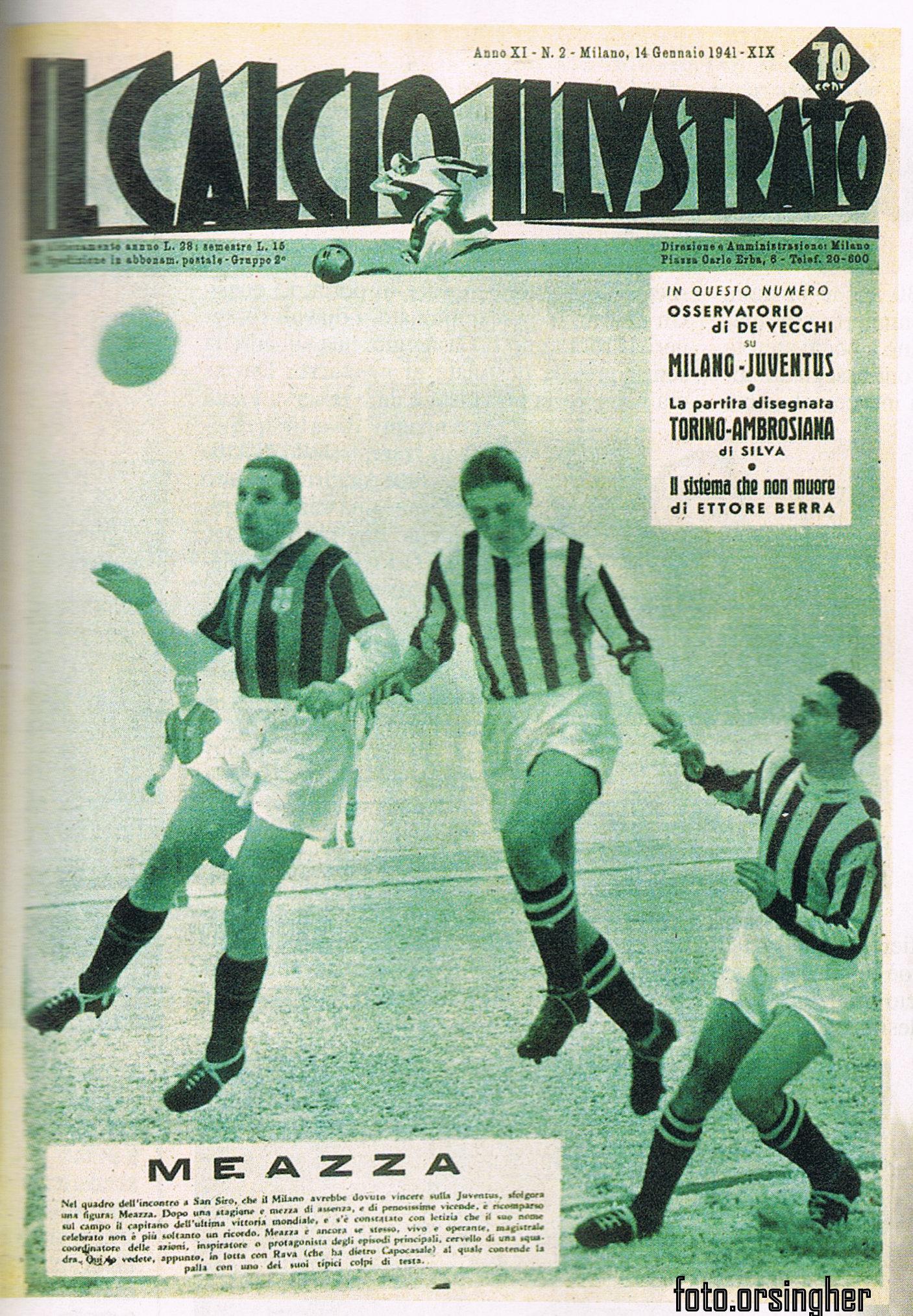
Inside the sports section, a full report was provided by an anonymous 'Special Correspondent'italians excited on the day of the game in little italy clerkenwell
ITALIAN FOOTBALLERS LOSE

England Score Three Goals in First 15 Minutes
TOO MUCH ROUGH PLAY BY VISITORS
From a Special Correspondent
England 3, Italy 2
London, Wednesday
Although the English Association football team beat Italy by only three goals to two at Highbury today they were never in danger of defeat. They took care to lead off with a grand attack and scored three times within the first 15 minutes. Possibly the Italians were bewildered at the beginning of the struggle.
 They may have been nervous. They may have had a slight attack of football fright. The Englishmen did not intend that they should recover, whatever their feelings were, and regain their normal mental balance and play their ordinary game.
They may have been nervous. They may have had a slight attack of football fright. The Englishmen did not intend that they should recover, whatever their feelings were, and regain their normal mental balance and play their ordinary game.

The opening moves were dramatic. Britton made a long pass down the centre of the field; Drake gathered the ball and advanced to near the right goal post; there the goalkeeper, Ceresoli, met him and Allemandi tackled from behind with the result that the goalkeeper and the centre forward were on the ground together; the whistle sounded for a penalty kick; Brook took the drive from the spot and tried to place the ball just under the bar, but Ceresoli sprang like a jumper and with both hands above his head beat the ball away with his palms.
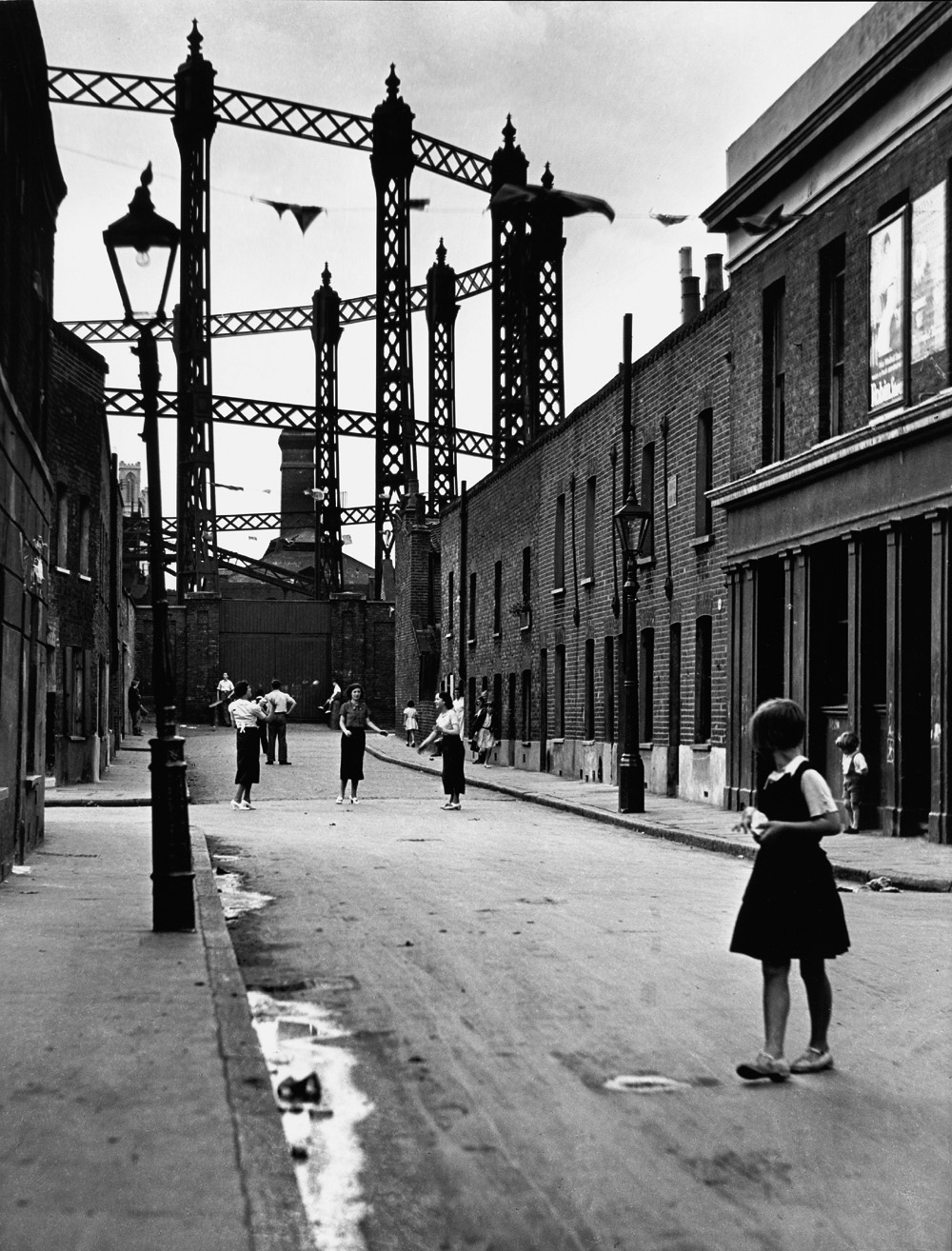 The cohorts of Italy cheered and Englishmen wondered what sort of a goalkeeper was this leaping acrobat. In his spectacular style he soon convinced the crowd that he was a Spring-heel Jack with a splendid sense of anticipation.
The cohorts of Italy cheered and Englishmen wondered what sort of a goalkeeper was this leaping acrobat. In his spectacular style he soon convinced the crowd that he was a Spring-heel Jack with a splendid sense of anticipation.
Fortunately England played superbly. They put the ball exactly where they desired, but Ceresoli foiled all the manoeuvres until a free-kick was given for dangerous play. Britton placed the ball well, and as it fell Brook headed into the net in a sharp oblique direction. This was well done, and England had delivered their first perfect blow in six minutes.
 The attack was maintained, and a free-kick was given against Italy just outside the penalty line. Brook put his weight behind the dead ball. Ceresoli got one hand to the shot but could not stay its progress, and the second goal was counted. Within three minutes Drake headed the third goal, and the spectators prepared for a total such as was run up against Spain on the same ground.
The attack was maintained, and a free-kick was given against Italy just outside the penalty line. Brook put his weight behind the dead ball. Ceresoli got one hand to the shot but could not stay its progress, and the second goal was counted. Within three minutes Drake headed the third goal, and the spectators prepared for a total such as was run up against Spain on the same ground.
No Relaxation
The home XI never relaxed, Bastin and Brook giving an infinite amount of trouble by their passing and quick shooting. But soon the Italians began to show some arresting combination, and Guaita made a drive that Moss was able to save. From the other wing Orsi made an excellent shot at the end of a run, but one could not repress the feeling that the visitors had peculiar ideas of a legitimate tackle. Once Brook was pulled down and another time he was tripped.
England entered on the second half with their three goals' lead, but they never scored again. Italy showed that they could play good football, but they were still inclined to "mix it", as folks say in this country. Brook became so exasperated against Italy's right half-back that he raised his fist. One cannot recall such an incident in any international match, but everyone was pleased that the Manchester City forward did not go beyond the threat of violence.
Italy were not daunted by even three goals and the loss of Monti, injured, for 13 minutes after the crossover Meazza crowned a straggling raid with a fine rocket shot that beat Moss, and four minutes later he made the most of a free-kick. These were both excellent shots, but not so clever as a hook with his left foot that Meazza made when a centre came in from Guaita. With only a goal in hand England rallied, but the defence prevailed.

Italy strove desperately to get on terms, but Moss saved from Ferrari and when Meazza had passed out to Guaita Moss was glad to cut out his centre at the expense of a corner. England were attacking when the match ended, but the Italians drew up and gave the Fascist salute, probably contented that they had run England on their own sward to a goal. Italy know all the tricks of the footballer's trade - and practised them. Well as they could play, however, one felt that they might have done better had they paid less attention to the man and more to the ball.
Teams: Moss (Arsenal): Male (Arsenal), Hapgood (Arsenal) (captain); Britton (Everton), Barker (Derby County), Copping (Arsenal); Matthews (Stoke), Bowden (Arsenal), Drake (Arsenal), Bastin (Arsenal), Brook (Manchester City).
ENGLAND:
ITALY: Ceresoli (Ambrosiana); Monzeglio (Bologna), Allemandi (Ambrosiana), Ferraris IV (Lazio), Monti (Juventus), Bertolini (Juventus); Guaita (Roma), Serantoni (Juventus), Meazza (Ambrosiana), Ferrari (Juventus), Orsi (Juventus).
Alongside the report, the Guardian provided a few gory details on the injuries the players had suffered
HAPGOOD'S NOSE BROKEN
Several other casualties
Hapgood, England's captain, arrived at the Football Association dinner for the English and Italian teams last night bearing undeniable evidence of the terrific struggle at Highbury. His nose, of which a bone had been broken above the bridge, had been stitched and was heavily plastered. Nearly all the England players were injured. Brook had his left arm X-rayed before going to the dinner, Bowden had a badly damaged ankle, and, according to an official of the English party, one of Drake's legs was "nearly cut to ribbons". Hapgood had one comment for publication. That was: "It was a hard-fought game to the end." Other members of the English party who saw the game were not so reticent.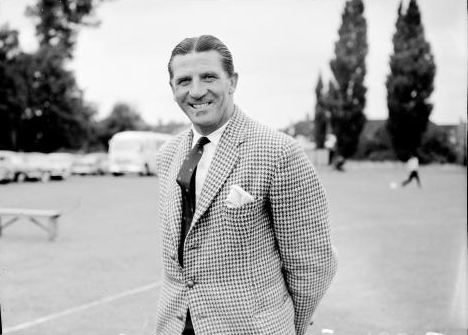
ted drake
The injury to Monti is much more serious than was thought at first. In the words of Signor Vozzo: "Monti is very badly hurt and will not be able to play for many months." He explained that after a minute and a half Monti, in trying to turn quickly, stubbed the toe of his boot in the ground. He was taken to hospital for examination, and after treatment returned to the hotel at which the Italians made their headquarters.
Ceresoli also suffered an injury to his right groin, and he looked rather pale and was limping when, with the remainder of the Italian team except Monti, he arrived for the dinner.

The match created such a stir that the newspaper felt compelled to publish an editorial on the matter. As the earlier references to Mussolini receiving match reports suggest, the Battle of Highbury was pregnant with a significance that outstripped simple sport. With nationalism on the rise in Europe, and international relations growing ever more strained, the Guardian was keen to play down the more sensationalist suggestions of other newspapers.

little italy london 1907
International footballIt is the pious hope of most, if not all, organisers of international sports contests that their efforts will contribute to the cause of peace and friendship. It is also true, however, that trade

It is partly because of this that we have heard recently so much silly talk about national prestige depending on the result of one match. These international games are to be encouraged only if they lead towards mutual understanding and goodwill; this they can do if each side, and the spectators, learn during the match that their opponents can be just as good sportsmen as, we hope, they are themselves.
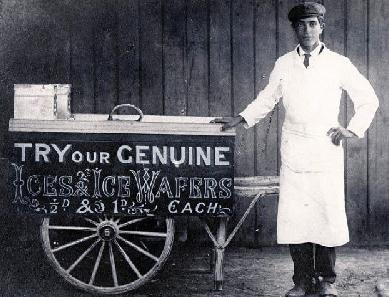
One of the things of which this country can be justly proud is that several foreign teams have admitted that they like playing before British crowds because of the fair play which they receive.
 In spite of excitable newspaper articles, there is still enough common sense left in Europe to prevent ordinary people from regarding England's 3-2 victory yesterday over a gallant Italian team in an Association football match at Highbury as either a triumph for the British National Government or a threat to the position of Mussolini in Italy.
In spite of excitable newspaper articles, there is still enough common sense left in Europe to prevent ordinary people from regarding England's 3-2 victory yesterday over a gallant Italian team in an Association football match at Highbury as either a triumph for the British National Government or a threat to the position of Mussolini in Italy.
By the next day however, the clamour had only grown louder. The Guardian reacted to the national outrage over Italy's performance by examining the calls for England to cease playing all international matches. The arguments put forward here will seem a lot more familiar than they should given that they are 74 years old. Some things, it seems, never change.
England v Italy
Comment abroad on the England v Italy Association match has not yet died down. Perhaps the most pungent observations were made in Spain, Czechoslovakia, Austria and Hungary, for teams representing those countries felt most, directly or indirectly, the effects of Italy's mixture of unwarrantable "fury" with her undoubted football talent when she won the so-called World Cup contest last summer. Spain drew with Italy, but in the words of a Madrid critic was "blasted out of the replay". Czechoslovakia forced Italy to play extra-time in the final, and were accused in some quarters of "a lack of the retaliatory spirit appropriate to the circumstances". The continent as a whole seems slow to see where sport leaves its domain and is obscured by nationalism and other rivalries. It would be regrettable if Europe saw anything like the deplorable public disturbances created by football rivalries in South America.The two sides
As a result of Wednesday's match two sides argue, the one that it would be a grave error on England's part to refrain from playing continental teams in future, the other, that in the interests of English football such games should be stopped at once. The clubs of the Football League are probably in favour of the latter course; at least some of the principal ones are, and they are the ones that count most. They say, as a well-known club official put it, that they ought not to have to risk their players in a game that means nothing to them (the clubs). "We lend a player worth about £6,000 or £7,000. He may be crocked for life in six or seven seconds in what, after all, counts for nothing more than an exhibition match," he added. That point of view is backed up by sound and substantial argument. The English clubs do not live by representative matches, and those in high places on the legislative side of the game will need all their powers of persuasion to make them see that international games outside the home quarters - England, Scotland, Wales, and Ireland - deserve their support.
Famous manager's view
On such a subject as this the opinion of a player is valuable. E Brook, the Manchester City the former international forward, now manager of Huddersfield Town, witnessed the match at Highbury, and is of the opinion that there should be no more matches with continental teams.
the former international forward, now manager of Huddersfield Town, witnessed the match at Highbury, and is of the opinion that there should be no more matches with continental teams.His opinion of the Italians is that they are less clever than the Austrians and that shorn of the "vigour" which has caused such a storm of protest by the press and clubs, they would be easy to beat. He does not regard them as a side well versed in the employment of the open style, which is the basis of modern football in this country. That opinion, coming from a man of his renown as a player and manager, is not to be dismissed lightly, whatever may be said by those who feel that England should not renounce its "missionary" work in spreading knowledge of the game abroad.
Subscribe to:
Posts (Atom)